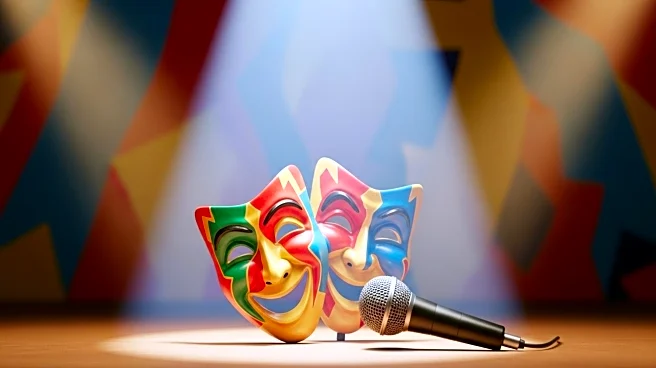What is the story about?
What's Happening?
A comedy festival in Riyadh, Saudi Arabia, has sparked controversy as prominent comedians face backlash for performing in a country criticized for its human rights record. The Riyadh Comedy Festival, featuring well-known comedians such as Dave Chappelle, Kevin Hart, and Aziz Ansari, has drawn criticism from fans, human rights advocates, and fellow comedians. Critics argue that the festival serves as a distraction from Saudi Arabia's repression of free speech and human rights violations. Human Rights Watch has called on performers to speak out against the detention of dissidents and journalists. The festival coincides with the anniversary of journalist Jamal Khashoggi's assassination, further intensifying scrutiny.
Why It's Important?
The participation of high-profile comedians in the Riyadh Comedy Festival highlights the ongoing debate over cultural engagement with countries accused of human rights abuses. Saudi Arabia's efforts to improve its global image through entertainment and tourism investments are seen by some as attempts to deflect attention from its domestic policies. The backlash underscores the ethical dilemmas faced by artists and entertainers when engaging with controversial regimes. The festival's timing, coinciding with significant anniversaries of human rights violations, amplifies the criticism and calls for accountability. This situation reflects broader tensions in international relations and cultural diplomacy.
What's Next?
The controversy surrounding the Riyadh Comedy Festival may lead to increased scrutiny of cultural events in Saudi Arabia and similar countries. Comedians and entertainers might face pressure to reconsider their participation in events hosted by regimes with questionable human rights records. Human rights organizations may continue to advocate for public statements from performers, urging them to address human rights issues. The festival's fallout could influence future decisions by artists and cultural institutions regarding engagements in Saudi Arabia, potentially affecting the country's cultural diplomacy strategy.
Beyond the Headlines
The festival's backlash highlights the complex interplay between cultural diplomacy and human rights advocacy. It raises questions about the role of artists in promoting or challenging political narratives. The situation also reflects broader ethical considerations in the entertainment industry, where financial incentives often clash with moral stances. The controversy may prompt discussions about the responsibilities of public figures in addressing global issues and the impact of cultural events on international perceptions of human rights.















